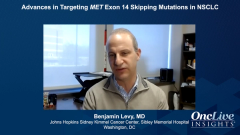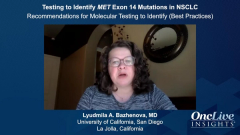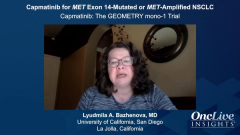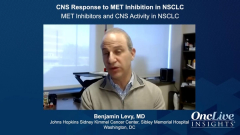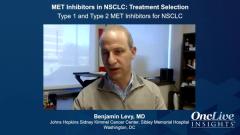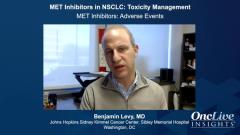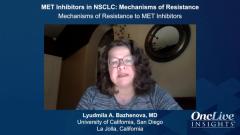
MET Inhibitors in NSCLC: Toxicity Management
Drs Joshua M. Bauml and Benjamin Levy highlight more common adverse events associated with MET inhibitors used to treat MET exon 14 skipping mutations in non–small cell lung cancer and share strategies to help manage patients on therapy.
Episodes in this series

Benjamin Levy, MD: What is important with these drugs, specifically with tepotinib, capmatinib, and even newer agents that are being tested like savolitinib, is that these agents have meaningful activity and are well tolerated. Most of the toxicities that we saw in the VISION and Geometry Mono-1 trials were grade 1 and 2. That’s important. The most common adverse events we see with these agents include edema and GI [gastrointestinal] toxicities—potentially nausea and constipation. We sometimes see an increase in liver function tests [LFTs] with these drugs. But overall, both are reasonably well tolerated, at least in my experience. We need to watch out for the nausea. The most common events seen with these drugs are peripheral edema and nausea, but there are ways to manage both. Keeping patients mobile can help with the peripheral edema. Regarding nausea, this is not an uncommon adverse effect we see with other types of treatments, including chemotherapy, so we’re all familiar with managing nausea with certain oral agents. In terms of liver function abnormalities, this is something that we have to sometimes do a watch-and-wait approach. Sometimes we have to take patients off the drug for a bit to see that their LFT is correct. But most times, we can do a dose decrement rather than take the patient off therapy completely. This where medicine becomes an art and not a science. Fortunately, we’re not forced to mitigate that much toxicity with measures that we have to institute in our clinic. Overall, the drugs are reasonably well tolerated. It’s not to say they’re perfect, so we just have to be mindful of these toxicities, including, again, peripheral edema, nausea, fatigue, and LFT abnormalities.
Joshua M. Bauml, MD: The primary adverse event I worry about when I’m starting a patient on either capmatinib or tepotinib is peripheral edema. This is a real issue. We see leg swelling that can effect quality of life. I have found that dose reductions can lead to improved outcomes. Sometimes, we do have to hold the drug. The edema that we’re talking about is not terribly responsive, in my experience, to diuretics, so I tend to work with dose reductions and dose holds. I get nervous about dose holds given the high dependency of these tumors for MET signaling, so I tend to utilize more dose reductions than dose holds.
TRANSCRIPT EDITED FOR CLARITY


